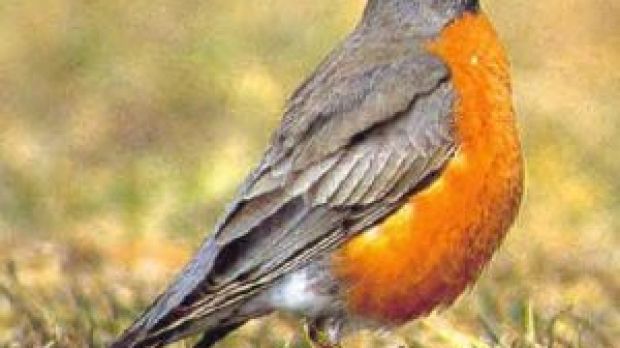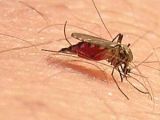The mosquitoes belonging to Culex genera are the principal vector of West Nile virus to humans. They seem to be picky eaters. Studies made on two species, Culex pipiens (photo bellow) and Culex restuans, led in North Eastern US, has revealed they prefer to attack certain bird species, in particular the American robin (photo above).
Analyzing the blood from mosquito feedings, scientists found that 43.4 % was robin, even if they formed about 3.7 % of the bird fauna at the study sites. That means that mosquitoes fed on robins 17 times more than expected in case of no dinning preference.
Analysis of robin blood from trapped birds showed a high prevalence of Vest Nile virus into the robin populations. "The concentration of virus in the blood reveals that there is 'host competence,'" Kilpatrick explained. "If robins were fed on often but didn't reproduce the virus, it wouldn't matter." In fact, more than half of West Nile virus-infected mosquitoes may have become infected by feeding on robins.
"This has two implications for humans, according to A. Marm Kilpatrick, a senior research scientist at the Consortium for Conservation Medicine in New York. First, by concentrating on a single bird species, mosquitoes transmit the virus more efficiently than if they spread their biting among several species. And because robins arrive early in the spring, epidemics start earlier in the year."
"When robins are around, they're fed on a lot. When they leave, the mosquitoes switch to people."
"Why Culex mosquitoes prefer some birds to others is unclear," said Kilpatrick.
Mosquitoes may be attracted by some particular species, because larger birds produce more heat and carbon dioxide (mosquitoes are lured by these two factors); the exposed skin surface in different species; roosting locations which made more vulnerable a species. Some species of birds can defend themselves or even actively feed on mosquitoes. This phenomenon has been observed in a larger area. "In Tennessee, the phenomenon has also been noticed," Kilpatrick said. "It looks like these mosquitoes love robins across a large area."

 14 DAY TRIAL //
14 DAY TRIAL // 
